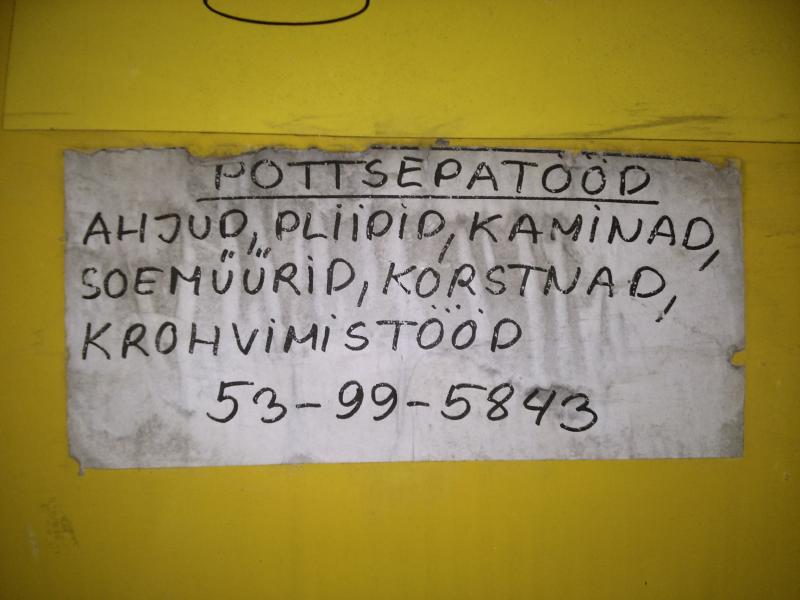Tänavalt. From the street. Estonian Life
PHOTO: Seen on a bright yellow
pakendi/ringluse/tünn (package recycling container) on Soo tänav (Swamp Street) in Tallinn’s Kala/maja (Fish House) district. A
pott/sepp is looking for work.
Pott/sepp is a compound word composed of
pott (pot) +
sepp (smith) and POTTER is one of its meanings, but not the primary one. In Estonia, a
pott/sepp is first and foremost a person who builds masonry stoves, ovens and other similar
kütte/kolded (heating sources) requiring specific knowledge of
müür/sepa/töö (masonry) and the inner workings or
lõõrid (flues or ducts) in the adjoining wall and/or chimney.
The tie-in between these two meanings – potter and stove oven mason – is that in Estonia, ceramic stoves, tile ovens and the
soe/müürid (“warm walls”) extending from them are traditionally made of
POTT/KIVI also called
”ahju/pott” – a specific type of
savi (clay) glazed tiles, the latter side of which are shaped like an open / hollow box. Once upon a time, the
pottkivi tiles were made by the same
pottsepp who constructed the oven or stove. Now the name has only stuck to phase two, the
ladumise or masonry part.
Pott/sepa/tööd are the jobs this particular
pottsepp is keen to help with:
ahjud, singular
ahi in this case is a masonry oven or stove, but is also the word for a furnace or kiln;
pliidid, sing.
pliit is a masonry stove you cook on top of, i.e. a cooking stove, the equivalent of a contemporary cooking or kitchen range;
kaminad, sing.
kamin is a fireplace and its floor is a
kolle (hearth).
A
soe/müür is the masonry or tiled wall behind the stove, which heats the room on the other side as well and is full of a network of
lõõrid (flues or ducts) regulated by a
siiber (damper). A singer is also said to have
lõõrid – his or her respiratory system and singers of all kinds, including birds
lõõritavad (warble or trill). “
MUL ON SIIBER!” is very common slang for “I’ve had enough” or “up to here” – no doubt up to the point where the damper is pushed into the duct to shut its flow of ventilation. Being
siiber usually stems from a direct source: “
Mul on sellest töökohast täiesti siiber ” – I’m totally fed up with this job.
Back to the ad at hand:
korstnad, singular
korsten is a chimney and
krohvimis/tööd are plastering jobs;
krohv is plaster or stucco. Don’t forget, if you want to call this given
pottsepp from abroad, you must first dial Estonia’s country code +372.
Photo and text: Riina Kindlam, Tallinn

